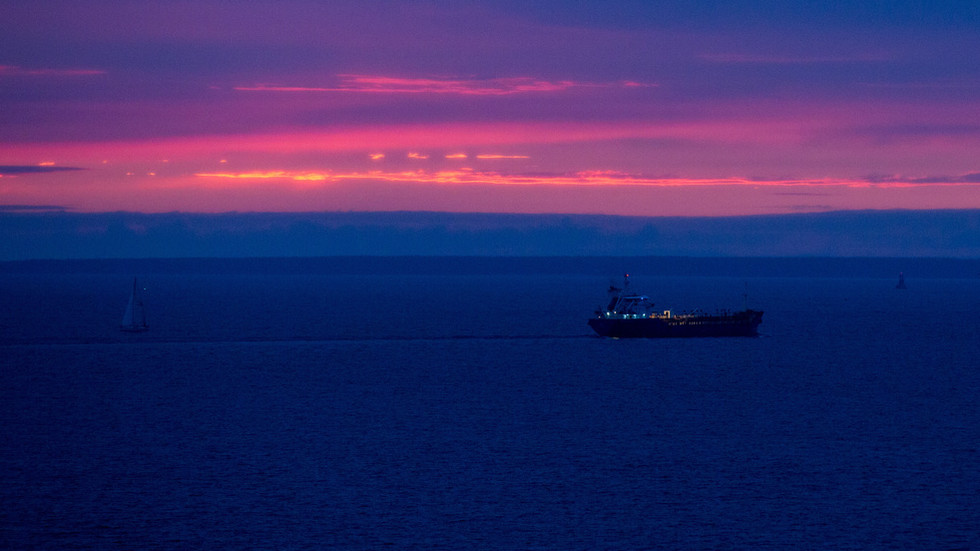A warship controlled by Vladimir Putin's forces may have fired a machinegun along with flares at a German helicopter during a skirmish, a new report has claimed.
Bild reported that the Russian warship 'Merkury', a 104.5m (343ft) long corvette, fired at a German NH-90 SeaLion chopper during the clash, which was reported earlier this week.
The SeaLion was investigation the Merkury amid suspicions it was a part of Russia's so-called 'Shadow Fleet', a collection of marine vessels used to evade international sanctions.
The newspaper reported that as the SeaLion approached at an altitude of 4,000ft (300m), shots were fired with signal ammunition at a distance of around four nautical miles (7.4km), before the Russian ship set its machinegun off into the water.
The Russian ship reportedly apologised for the incident, but little more is known about the flare-up.
The German government has so far refused to comment, with Bild reporting that defence officials are investigating the incident as top secret.
German foreign minister Annalena Baerbock mentioned the incident at a NATO meeting but did not give further details.
NATO is currently carrying out increased surveillance in the Baltic Sea to prevent hybrid attacks on pipelines and data cables by Russia and its supporters.
Bild reported that the Russian warship 'Merkury' (pictured) fired at a German chopper
Germany sent over a NH-0 SeaLion to investigate a possible Shadow Fleet vessel
Tensions between the West and Vladimir Putin's (pictured) Russia have been rising significantly in recent months
The Baltic Sea is bordered by eight Nato countries and Russia.
There have been at least three incidents of possible sabotage to the 40-odd telecommunication cables and critical gas pipelines that run along its relatively shallow seabed since 2022, when Russia invaded Ukraine.
'NATO is stepping up patrols... allies are investing in innovative technologies that can help better secure these assets,' commander Arlo Abrahamson, a spokesperson for Nato's Allied Maritime Command previously said.
Yet the ease with which a ship's anchor can slice through a cable, coupled with the often-treacherous sea conditions, makes actual prevention of such attacks almost impossible.
Tensions between Russia and the West have been rising so high in recent weeks that defence chiefs from Russia and the US held a rare phone call last week.
Direct contact between Moscow and Washington has almost ceased to exist amid Russia's military offensive on Ukraine, and the Kremlin has said it considers the United States a direct participant in the conflict.
The call, between Russia's Chief of the General Staff Valery Gerasimov and the US Chairman of the Joint Chiefs of Staff General Charles Brown occurred on November 27 and was held at the request of the Russian side, both Moscow and Washington said.
'The leaders discussed a number of global and regional security issues to include the ongoing conflict in Ukraine,' Brown's spokesman told AFP.
A Yars intercontinental ballistic missile is test-fired as part of Russia's nuclear drills from a launch site in Plesetsk, northwestern Russia
Former Russian president Dmitry Medvedev, now a senior Kremlin security official, pictured with Vladimir Putin
It the was the first call between the pair since Brown took over the role in October 2023.
The Russian defence ministry said Gerasimov had informed Brown about Russian military drills in the eastern Mediterranean, announced as Moscow conducts air strikes to support its ally, Syrian President Bashar al-Assad quash an Islamist-led rebellion.
'This information was given with the goal of preventing possibile incidents in connection with the presence of US and NATO ships near the area of Russian drills,' it said in a statement on Telegram.
It did not mention Ukraine or any other topic.
Citing a US military spokesperson, the New York Times reported that the pair discussed Russia's new Oreshnik hypersonic ballistic missile.
Brown also expressed US concern over the deployment of North Korean troops to support Russia's army on the battlefield, CNN reported.
Despite the West's reticence to comment on the matter for fear of further escalation, Russia has had no such qualms about using fiery language to stoke tensions.
Former Russian president and prime minister Dmitry Medvedev even declared late last month that Nato and the US is at 'full war' with Russia.
Medvedev declared that the West crossed 'all red lines' and is now 'at war with Russia'.
The close Mr Putin ally who now serves as the deputy chairman of Russia's Security Council, said that every Ukrainian strike on Russian territory with Western weapons would be met with a response.
'It's not going to go unnoticed... It will change the rules of engagement - it's proof that Nato and Washington and other participants in the alliance are not just participating in a hybrid war, but a war in every sense of the word against our country.
'Negotiations are a long way off, events like this could push those negotiations back even further,' he told Saudi Arabia's Al-Arabiya.
'Any strikes on Russia are unequivocally unacceptable. What happened was a crossing of all red lines.'

 By Daily Mail (World News) | Created at 2024-12-05 17:05:18 | Updated at 2024-12-26 01:05:28
2 weeks ago
By Daily Mail (World News) | Created at 2024-12-05 17:05:18 | Updated at 2024-12-26 01:05:28
2 weeks ago








